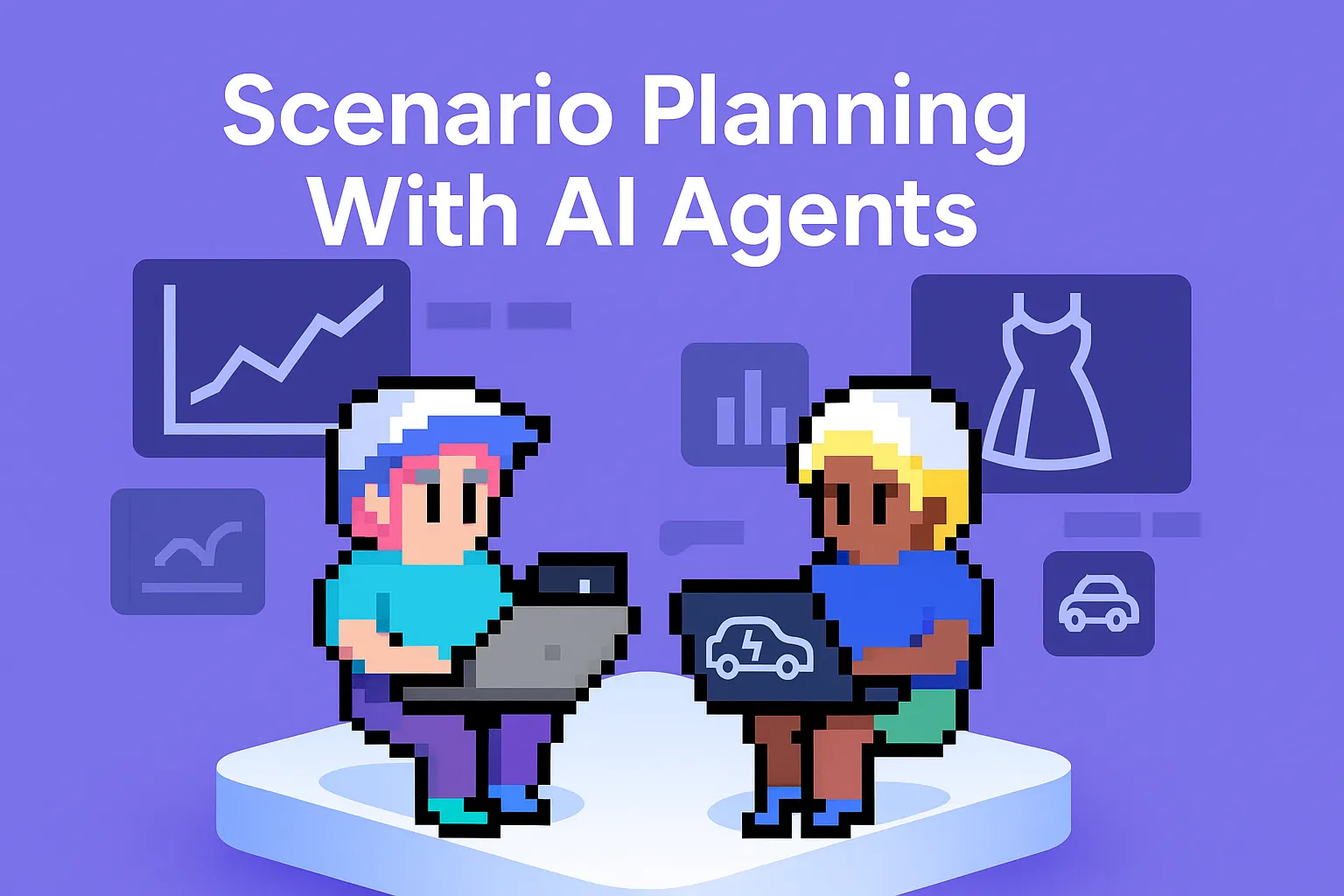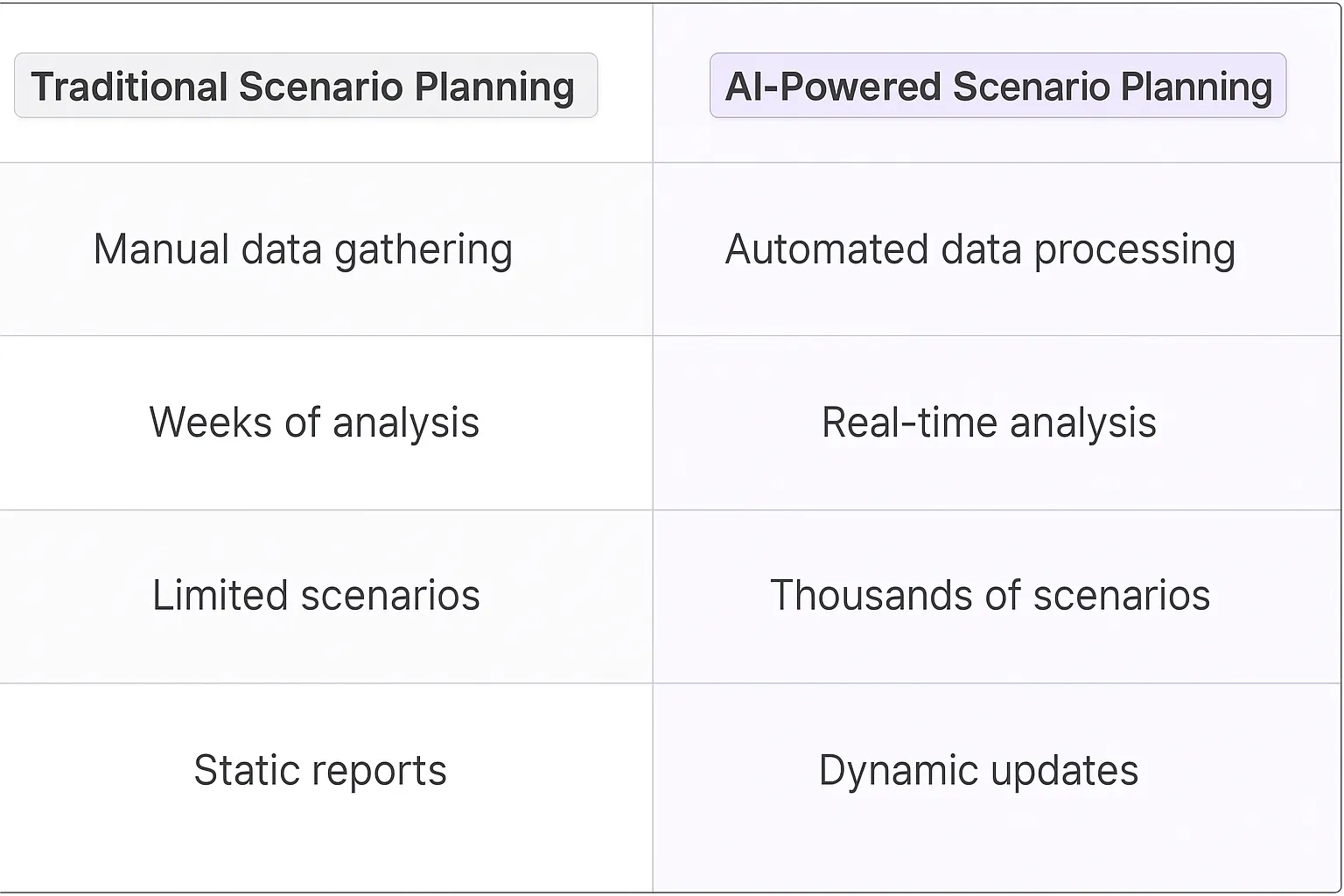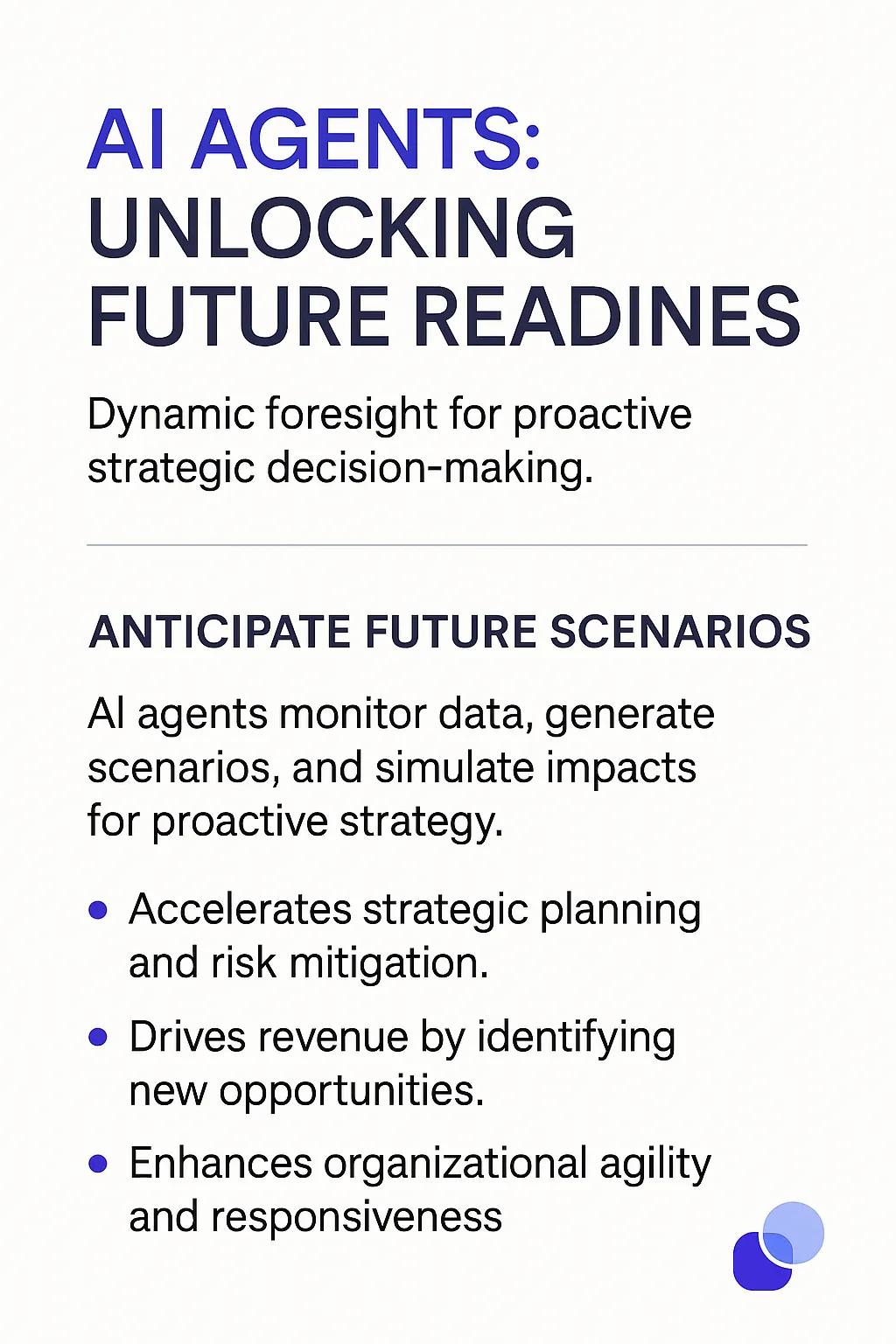Scenario Planning and Analysis AI Agents
Understanding Scenario Planning and Analysis
Scenario planning and analysis is a strategic method used by organizations to explore and prepare for various possible futures. It involves developing multiple, plausible scenarios based on current trends, uncertainties, and potential disruptors. This process helps decision-makers anticipate challenges, identify opportunities, and create more robust, flexible strategies. It's not about predicting the future, but about being prepared for multiple potential outcomes.
The key features of scenario planning and analysis include:1. Multiple scenario development: Creating diverse, plausible future scenarios.2. Trend analysis: Identifying and extrapolating current trends.3. Uncertainty mapping: Recognizing key uncertainties that could significantly impact outcomes.4. Impact assessment: Evaluating how different scenarios might affect the organization.5. Strategy formulation: Developing flexible strategies that can adapt to various scenarios.6. Continuous monitoring: Regularly updating scenarios based on new information and changing conditions.7. Cross-functional collaboration: Involving diverse perspectives from across the organization.8. Narrative creation: Crafting compelling stories around each scenario to make them more tangible and actionable.

Benefits of AI Agents for Scenario Planning and Analysis
What would have been used before AI Agents?
Before AI agents entered the scene, scenario planning and analysis was a time-consuming, manual process. Teams would spend weeks, if not months, gathering data, building complex spreadsheets, and running countless simulations. It was like trying to predict the weather with a wet finger in the air – possible, but wildly inefficient and often inaccurate.
Companies relied heavily on human analysts, who, despite their expertise, were limited by cognitive biases and the sheer volume of data they could process. The result? Slow decision-making, missed opportunities, and strategies based on outdated information. It was like driving a car by only looking in the rearview mirror – you might avoid some obstacles, but you're definitely not seeing the full picture.
What are the benefits of AI Agents?
Enter AI agents – the game-changers in scenario planning and analysis. These digital teammates are like having a team of genius analysts working 24/7, processing vast amounts of data at lightning speed. They're not just fast; they're smart, learning from each iteration and improving their predictions over time.
One of the biggest benefits is the ability to run thousands of scenarios simultaneously. It's like playing chess against a grandmaster who can see 20 moves ahead – you're suddenly aware of possibilities and risks you never even considered. This level of foresight allows companies to make proactive decisions rather than reactive ones.
AI agents also excel at identifying subtle patterns and correlations that human analysts might miss. They can pull insights from diverse data sources – market trends, social media sentiment, geopolitical events – and weave them into a cohesive narrative. It's like having a bird's-eye view of the entire business landscape, with the ability to zoom in on any detail at will.
Perhaps most importantly, AI agents democratize scenario planning. They make sophisticated analysis accessible to smaller teams and companies that couldn't afford a large analytics department. It's like giving everyone a supercomputer in their pocket – suddenly, strategic foresight isn't just for the big players anymore.
The real magic happens when AI agents and human strategists work together. The AI handles the heavy lifting of data processing and initial analysis, freeing up humans to focus on creative problem-solving and nuanced decision-making. It's a partnership that combines the best of both worlds – machine precision and human intuition.
In the end, AI agents for scenario planning and analysis aren't just tools; they're catalysts for a new era of strategic thinking. They're pushing the boundaries of what's possible in business strategy, helping companies not just predict the future, but shape it. And in a world where change is the only constant, that's a superpower worth having.

Potential Use Cases of AI Agents for Scenario Planning and Analysis
Processes
Scenario planning and analysis is a critical process for businesses navigating uncertain futures. AI agents can significantly enhance this process, bringing a new level of depth and sophistication to strategic decision-making. These digital teammates can rapidly process vast amounts of data, identify patterns, and generate complex scenarios that human analysts might overlook.
One key process where AI agents excel is in developing multiple future scenarios based on various input parameters. They can quickly generate hundreds of potential outcomes, each accounting for different combinations of market conditions, technological advancements, regulatory changes, and competitive landscapes. This allows strategists to explore a much broader range of possibilities than traditional methods permit.
Another crucial process is sensitivity analysis. AI agents can systematically vary individual factors within scenarios to determine which variables have the most significant impact on outcomes. This helps decision-makers focus their attention on the most critical uncertainties and develop more robust strategies.
Tasks
When it comes to specific tasks, AI agents for scenario planning and analysis can be game-changers. They can continuously monitor and analyze real-time data from various sources, including news feeds, social media, economic indicators, and industry reports. This ongoing analysis allows for the rapid identification of emerging trends or potential disruptors that could impact existing scenarios.
These digital teammates can also assist in quantifying the potential impact of different scenarios on key business metrics. By running simulations based on historical data and projected trends, they can provide detailed forecasts of how various scenarios might affect revenue, market share, profitability, and other crucial KPIs.
Moreover, AI agents can help in crafting narrative descriptions for each scenario, translating complex data patterns into coherent stories that decision-makers can easily understand and act upon. This storytelling aspect is crucial for effective communication of scenario analyses across the organization.
Another valuable task is the identification of early warning indicators for each scenario. AI agents can suggest specific metrics or events to monitor that would signal the unfolding of a particular scenario, enabling organizations to respond proactively to changing conditions.
The Andrew Chen Take: AI Agents in Scenario Planning
Let's talk about how AI agents are reshaping scenario planning and analysis. This isn't just an incremental improvement - it's a fundamental shift in how companies can approach strategic decision-making.
First off, the sheer computational power these AI agents bring to the table is mind-blowing. We're talking about the ability to process and analyze data at a scale that would take human analysts months, if not years. But it's not just about speed - it's about depth and breadth of analysis.
These AI agents are like having a team of genius analysts working 24/7, constantly sifting through data, identifying patterns, and generating insights. They're not replacing human strategists, but they're dramatically amplifying their capabilities.
One of the most exciting aspects is how these AI agents can help companies break free from cognitive biases and groupthink. By generating a wide range of scenarios based purely on data and algorithms, they can surface possibilities that might never occur to human planners. This can be a real game-changer in industries facing disruption or high uncertainty.
Another key point is the dynamic nature of AI-powered scenario planning. Traditional scenario planning often produces static reports that quickly become outdated. With AI agents, scenario planning becomes a living, breathing process. These digital teammates can continuously update scenarios based on new data, ensuring that strategic planning remains relevant in fast-changing environments.
But here's the kicker - the real power of AI in scenario planning isn't just in generating scenarios, it's in helping companies become more adaptable. By constantly running simulations and updating probabilities, these AI agents can help organizations develop a more fluid, responsive approach to strategy. It's about building organizational muscles for agility and resilience.
In the end, AI-powered scenario planning isn't just a tool - it's a new way of thinking about the future. It's about embracing uncertainty and using it as a strategic advantage. Companies that leverage these AI agents effectively will be better prepared to navigate the complexities of our rapidly evolving business landscape.

Industry Use Cases
AI agents are reshaping scenario planning and analysis across sectors, offering a level of sophistication that's hard to ignore. These digital teammates aren't just crunching numbers; they're providing insights that can make or break strategic decisions. Let's dive into some industry-specific examples that showcase how AI is elevating the game in scenario planning.
From finance to healthcare, manufacturing to retail, AI agents are becoming indispensable partners in navigating complex futures. They're not replacing human intuition but amplifying it, allowing teams to explore a multitude of 'what-ifs' with unprecedented speed and accuracy. The result? More robust strategies, better-prepared organizations, and a competitive edge that's becoming increasingly critical in our rapidly evolving business landscape.
As we explore these use cases, keep in mind that we're not just talking about incremental improvements. These AI-driven approaches to scenario planning are fundamentally altering how organizations think about and prepare for the future. It's a shift that's as profound as it is exciting, and it's happening right now across industries.
Scenario Planning in the Electric Vehicle Industry
The electric vehicle (EV) industry is a perfect playground for scenario planning AI agents. These digital teammates can crunch massive datasets and simulate countless future scenarios, giving automakers a serious edge in this rapidly evolving market.
Let's zoom in on how an EV manufacturer might leverage these AI agents. They're not just dealing with traditional auto industry factors like consumer preferences and supply chain logistics. They're also navigating a complex web of government regulations, charging infrastructure development, and battery technology advancements.
An AI agent specializing in scenario planning could simultaneously model:
- Changes in government incentives across different countries and states
- Potential breakthroughs in solid-state battery technology
- Shifts in consumer sentiment towards different EV models
- The rollout of charging stations in urban, suburban, and rural areas
- Fluctuations in raw material prices for battery components
By running thousands of simulations based on these variables, the AI agent can identify potential "perfect storm" scenarios where multiple factors align to create either massive opportunities or significant risks.
For instance, it might flag a scenario where a breakthrough in battery tech coincides with a surge in government incentives in a particular region, signaling an ideal time and place for a product launch. Or it could highlight a potential crisis where supply chain disruptions overlap with shifting consumer preferences, allowing the company to develop contingency plans.
The real power here isn't just in the predictions, but in the strategic optionality it creates. By understanding a wide range of possible futures, EV manufacturers can build more resilient strategies, make smarter bets on R&D, and position themselves to capitalize on emerging trends before their competitors even see them coming.
This isn't just incremental improvement - it's a fundamental shift in how companies can approach long-term planning in complex, fast-moving industries. And as these AI agents get smarter and more sophisticated, they'll become an indispensable tool for any EV company looking to stay ahead of the curve.
Scenario Planning in the Fashion Industry
The fashion industry is ripe for disruption by AI-powered scenario planning. It's a sector where trends can shift overnight, supply chains span the globe, and consumer preferences are notoriously fickle. Enter the scenario planning AI agent - a digital teammate that can navigate this complex landscape with ease.
Let's break down how a major fashion retailer might leverage this technology. They're not just dealing with typical retail challenges like inventory management and marketing. They're also grappling with sustainability concerns, the rise of fast fashion, and the increasing demand for personalization.
A sophisticated scenario planning AI could simultaneously model:
- Shifts in consumer sentiment towards sustainable and ethical fashion
- The impact of social media trends on demand for specific styles
- Changes in global trade policies affecting textile sourcing
- The growth of direct-to-consumer brands and their effect on traditional retail
- Advancements in on-demand manufacturing and 3D printing for apparel
By running these variables through countless simulations, the AI can identify potential game-changing scenarios that human analysts might miss. It's not just about predicting the next big trend - it's about understanding the complex interplay of factors that shape the entire fashion ecosystem.
For example, the AI might flag a scenario where a viral social media trend coincides with a breakthrough in sustainable fabric technology, signaling an opportunity to launch a eco-friendly, influencer-driven collection. Or it could highlight a potential crisis where trade disputes overlap with a shift in consumer behavior towards locally-made products, allowing the company to adjust its sourcing strategy ahead of time.
The real power of this approach lies in its ability to uncover non-obvious connections and second-order effects. It's not just about reacting to trends, but anticipating and shaping them. By understanding a wide range of possible futures, fashion companies can build more adaptable business models, make smarter investments in emerging technologies, and position themselves to capitalize on shifts in consumer behavior before they become mainstream.
This isn't just a nice-to-have tool - it's becoming a necessity in an industry where the only constant is change. As these AI agents evolve, they'll become as essential to fashion executives as a good lookbook. The companies that embrace this technology won't just be following trends - they'll be creating them.
Considerations
Technical Challenges
Implementing a Scenario Planning and Analysis AI Agent isn't just about slapping some machine learning algorithms together and calling it a day. It's a complex beast that requires serious technical chops and a deep understanding of both AI and business strategy.
First off, you're dealing with massive amounts of data from various sources. Your AI needs to ingest, process, and make sense of everything from market trends to competitor moves, economic indicators, and internal company data. It's like trying to drink from a firehose while solving a Rubik's cube blindfolded.
Then there's the challenge of creating accurate predictive models. Your AI isn't just playing chess; it's playing 4D chess with incomplete information. It needs to generate plausible future scenarios based on complex, interconnected variables. One wrong assumption, and your entire strategy could be built on a house of cards.
Let's not forget about the user interface. Your brilliant AI is useless if decision-makers can't interact with it effectively. You need to create an intuitive interface that can present complex scenarios and insights in a way that doesn't require a PhD to understand.
Operational Challenges
On the operational side, things get even trickier. You're essentially asking your organization to trust a digital teammate with critical strategic decisions. That's a tough sell, especially for old-school executives who trust their gut more than an algorithm.
There's also the question of integration. Your AI agent needs to play nice with existing systems and processes. It can't be an isolated tool; it needs to be woven into the fabric of your organization's decision-making process. This requires not just technical integration but also a shift in organizational culture and mindset.
Data quality and governance are huge hurdles too. Your AI is only as good as the data it's fed. Ensuring you have clean, reliable, and up-to-date data is a Herculean task in itself. And let's not even get started on the regulatory and compliance issues around data usage and AI-driven decision making.
Finally, there's the challenge of continuous improvement. The business world doesn't stand still, and neither should your AI. You need a system for constantly updating and refining your models based on new data and changing market conditions. It's like trying to upgrade the engine of a car while it's speeding down the highway.
Implementing a Scenario Planning and Analysis AI Agent is not for the faint of heart. It's a high-risk, high-reward endeavor that requires a perfect storm of technical expertise, organizational buy-in, and strategic vision. But for those who can pull it off, it's like having a crystal ball and a supercomputer rolled into one. The potential to outmaneuver competitors and navigate uncertain futures is immense. Just be prepared for a wild ride.
Shaping the Future with AI-Powered Strategic Foresight
AI agents are not just enhancing scenario planning and analysis; they're fundamentally reshaping how organizations approach strategic decision-making. These digital teammates bring unprecedented computational power, depth of analysis, and adaptability to the table. They're breaking down cognitive biases, democratizing sophisticated analysis, and turning scenario planning from a static exercise into a dynamic, ongoing process.
The real power of AI in this context lies in its ability to help organizations become more agile and resilient. By continuously running simulations, updating probabilities, and identifying emerging trends, AI agents are enabling companies to develop a more fluid, responsive approach to strategy. This isn't just about predicting the future - it's about building the organizational muscles to thrive in uncertainty.
As we've seen in industries from electric vehicles to fashion, the applications are vast and transformative. However, implementing these systems comes with significant technical and operational challenges. Organizations that can overcome these hurdles and effectively leverage AI agents for scenario planning will gain a significant competitive edge.
In the end, AI-powered scenario planning and analysis represents a new way of thinking about the future. It's about embracing uncertainty, using it as a strategic advantage, and being prepared to pivot quickly as conditions change. As these AI agents continue to evolve, they will become indispensable tools for any organization looking to navigate the complexities of our rapidly changing business landscape. The future belongs to those who can not only anticipate it but shape it - and AI agents are proving to be powerful allies in this endeavor.













